1. Introduction
With the general availability of generative AI technology, how companies and other institutions should design their internal management environments in response to the increasingly digitalized external environment is an issue of the day. In this article, I would like to discuss relevant issues from the business strategy and administration perspective regarding standardization based on the Survey on Standardization Activities 2021 results (Tamura, 2023).
The digitization of the modern economy is based on the increase in the volume of data distribution, which is possible thanks to the development of communications technology. To exchange data, it is necessary to commonalize communications technologies, which generally means standardizing technologies. The standardization discussed here refers to, for example, technical arrangements regarding communication over the Internet that are set up among multiple vendors and telecommunications carriers.
The following discussion is based on the results of a questionnaire survey (Survey on Standardization Activities [SoSA] 2021) conducted by the author. The SoSA is a survey of standardization activities of Japanese companies and other entities and includes a survey item on managerial issues within the institutions. In particular, the degree of implementation of standardization activities and the ratio of respondents that have created departments that are responsible for managing standardization activities are the two main indicators in the SoSA for understanding standardization activities in an institution.
Previously, measuring standardization activities within an institution was considered difficult (Tamura, 2012, 2013). In addition, qualitative research results on intellectual property departments and corporate strategy within institutions point out that due to changes in the external environment, patent management departments in Japanese firms are transforming their functions from administrative processing departments to strategy execution departments (Hirata et al., 2001). Similarly, the transformation of standardization organizations within Japanese institutions from administrative processing departments to strategy implementation departments has been observed, caused by changes in the external environment (Tamura, 2012). However, these analyses are based on individual case surveys and not based on quantitative data. This article discussed issues related to standardization using quantitative survey results. For future research related to standardization, it is important to accumulate time series data ranging multiple years so that time-series analysis becomes possible.
SoSAs have been conducted four times between 2017 and 2020 before the current survey covering 2021, excluding this survey 2021(Tamura, 2019, 2020, 2021, 2022a). This survey series is not a needs assessment survey of technologies to be standardized, which is generally conducted by standards development organizations (SDOs). This survey in 2021 follows the same format as the previous four surveys (Tamura, 2022b). The survey covered approximately 180 institutions. The survey was mailed directly to participating institutions, and respondents submitted their responses via e-mail or postal mail (i.e., this is not an online survey outsourced to an Internet survey company. It is a voluntary and uncompensated survey). Both electronic and postal submission methods were used to distribute and collect the questionnaires. The survey period was from January to March 2023. Approximately 180 questionnaires were sent out and 75 responses were received. The response rate was approximately 40%.
2. Results and Discussion
2.1. Degree of implementation of standardization activities (by industry category and R&D budget distribution)
In the 2021 survey, the percentage of respondents implementing standardization activities was 68.8%, almost the same as the previous year (Table 1). When looking at changes over time using pooled data for the past five years, the results show that the increase is statistically significant (at the 5% level) (Tamura, 2019, 2020, 2021, 2022a, 2023). By industry, the percentage of implementation is higher in the information and communications industry. As a general trend, the higher the R&D expenditures, the higher the implementation rate of standardization activities (Tables 2 and 3).
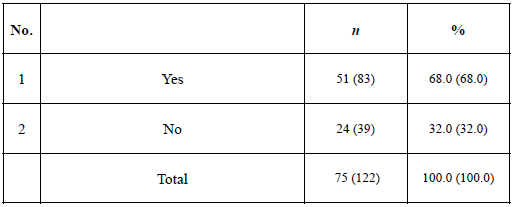
Figures in parentheses represent the results for the previous year, 2020.
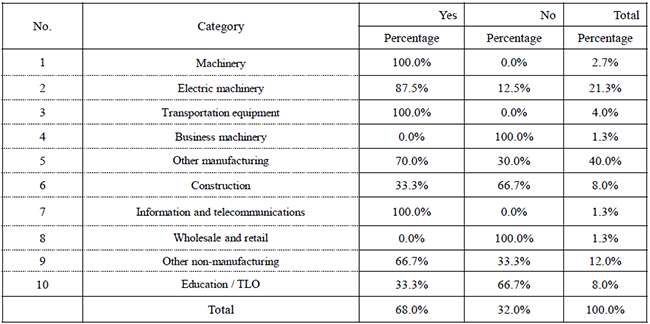
[Click to enlarge]
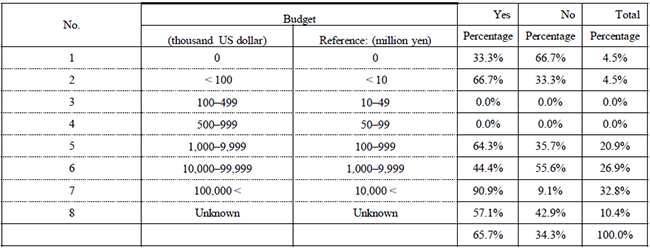
[Click to enlarge]
2.2 Organization for standardization Activities (by industry category and R&D budget distribution)
Forty-four respondents (about 44.0%) answered that they have a management system (organization) for standardization activities (Table 4). This result corresponds to the upward trend observed throughout the past four surveys (Tamura, 2019, 2020, 2021, 2022a). However, when looking at changes over time using pooled data for the past five years, the results are not statistically significant (at the 5% level). By industry, the percentage of companies that reported having developed standardization management departments is high in the information and telecommunications industry and the electric machinery industry. As a general trend, the higher the R&D expenditures in the industry, the higher the percentage of companies that have developed departments that manage standardization activities (Tables 5 and 6).
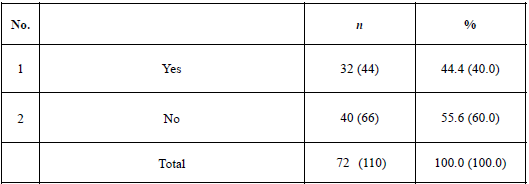
Figures in parentheses represent the results for the previous year, 2020
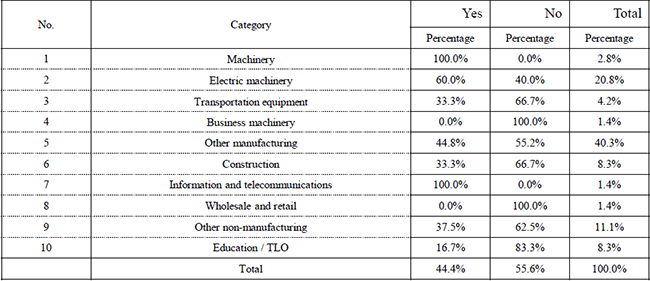
[Click to enlarge]
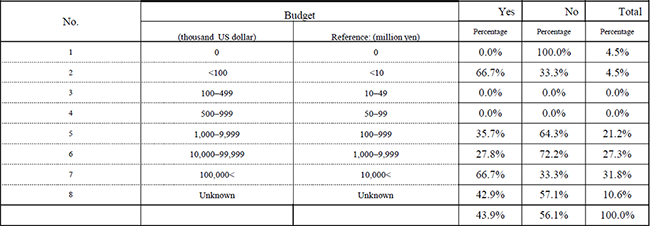
[Click to enlarge]
2.3 Protection of R&D information and trade secrets
One of the advantages of developing a department that manages standardization activities is that it facilitates company-wide standardization activities in a unified manner. Another advantage of organizational development is that it facilitates the formulation and operation of management policies that govern the administration of standardization activities within the institution.
The survey also asked whether administrative guidelines overseeing standardization activities exist and whether these documents include provisions for managing research information. About 24% of the respondents had created and administered guidelines for supervising standardization activities. Furthermore, about 63% of those who created guidelines indicated that those guidelines include provisions for handling R&D information (Tamura, 2023).
In this connection, the participants were surveyed in relation to how SDOs handled research information (Table 7). 15.5% responded that confidentiality of information is necessary, but nondisclosure agreements (NDAs) are not required, or that confidentiality of information is not required. 12.1% of respondents answered that they had NDAs. The results may be useful for policymakers in Japan, such as the Japan Fair Trade Commission, in developing their awareness of this issue regarding the protection of R&D information.
The issue of the need to control information and data during the standardization process is not adequately recognized by the parties participating in standardization activities or the SDO secretariat, which is the forum for standardization activities, because the knowledge created during standardization activities is currently considered neither a completely confidential technology nor an academic achievement. The prohibition of academic plagiarism protects academic authorship. This R&D information protection is the point that needs to be addressed in order to ensure competitiveness through standardization. This issue should be kept in mind, especially in relation to next-generation mobile communication standards and video transmission standards.
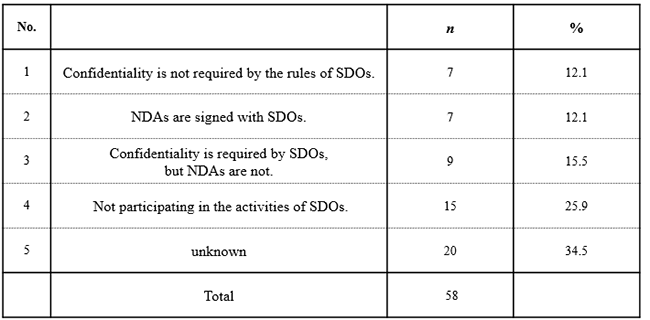
3. Conclusion
While a statistically significant upward trend in the degree of standardization activity has been observed over the past five years, no statistically significant upward trend has been observed in the development of standardization departments . An intuitive understanding of the mechanism could be that within institutions, the implementation of standardization activities is rising in response to exogenous shocks, but the shocks have not caused companies to establish standardization management departments. If standardization activities are increasing in the company as a whole due to an external shock, but organizational development fails to progress, the company may suffer from inefficient operation due to a lack of clarity in terms of its responsibilities. The development of responsible departments will enable efficient and strategic management of research information, to which little attention has been paid in standardization activities. This perspective is strategically important in order to ensure that competitiveness is maintained while engaging in standardization activities. For institutions that intend to engage in standardization activities in the future, developing a management department is important for the strategic promotion of standardization.
Acknowledgments
I would like to express my sincere appreciation to those who made time to provide responses to the survey despite their busy schedules. I would like to thank the Technical Regulations, Standards, and Conformity Assessment Unit at the Ministry of Economy, Trade, and Industry (METI) and the Japanese Standards Association (JSA). In addition, I extend special thanks to the ISO secretariat officials for their cooperation in including the results of previous surveys in the ISO Research Library.
The study was supported by JSPS Grants-in-Aid for Scientific Research (15K03718, 19K01827, and 23K01529; Principal Investigator: TAMURA, Suguru). Due to its academic importance, the JSPS granting policy is appended as follows. “The views and responsibilities regarding research results resulting from a grant shall exclusively belong to the researcher; the implementation and publication of said research results are not based on requests from the Japanese government body that provides the grant or others. Namely, the research funded by Grants-in-Aid for Scientific Research shall be conducted under the individual researcher’s authority with the researcher’s awareness and responsibility.” (Handbook on Grants-in-Aid for Scientific Research Program [Japan Society for the Promotion of Science] [in Japanese])
October 6, 2023
>> Original text in Japanese


